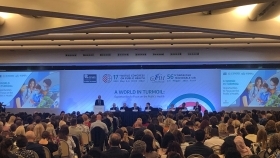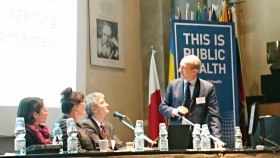
by strengthening education and training
of public health professionals
for both practice and research



The Association of Schools of Public Health in the European Region (ASPHER)
ASPHER is the key independent European organisation dedicated to strengthening the role of public health by improving education and training of public health professionals for both practice and research.Secretariat updates
FULL REPORT NOW AVAILABLE HERE!
ASPHER Young Professionals: Ines Siepmann, Pallavi Chatarajupalli, Ranjeet Dhonkal, Melissa Sawaya, Tobias Weitzel & ASPHER Director - Robert Otok
The coronavirus disease 2019 (COVID-19) pandemic has significantly altered the education environment. Institutions have been tasked with implementing rapid responses that allow for a continuity of education, effective course provision, and ongoing support services for students, all while keeping students, faculty, and staff healthy and safe. The constantly changing health environment makes this increasingly difficult, as does a lack of available research on best practices. The goal of this rapid review is to gather information about the planning and preparedness of Schools of Public Health (SPH) in the European Region for reopening campuses after closure due to the COVID-19 pandemic. The collection of this information, along with a follow-up in September, will provide both a record of the reactions and allow for quantitative and qualitative analysis of the different paths and rationale present amongst the convenience sample of 32 schools included. By promoting dialogue, SPH can better design and enact policies and recommendations relevant to them. Indeed, few national authorities have launched specific guidance for reopening higher education campuses. European SPH could play a critical role in policy and guideline development.
The review was conducted via email with initial contact made by Robert Otok and follow-up done by the Young Professionals (YPs) during the week of July 22-29. Schools from the ASPHER network were chosen as a convenience sample. Of the 59 schools contacted, 32 responded. Preliminary statistical analysis has been done, with further qualitative analysis using the thematic analysis method in progress. Schools were asked about their plans for teaching and exam methods, new recruitment and international policies, equipment and infrastructure development, budget and contingency planning, whether or not they felt safe returning to campus, and if decisions in general were evidence-based.
Regarding the form of teaching, 65% of schools will rely on hybrid learning via online platforms on which a combination of synchronous as well asynchronous activities will take place in addition to socially distanced face-to-face sessions. Given that the majority of schools will rely on online learning, particular online software such as Moodle and Wiseflow will be used to monitor and assess students during exams for approximately half the schools. Other schools will avoid classic examination and instead focus on other forms of assessment such as open book exams, written assignments, and presentations.
Figure: Method of delivery
In terms of technological infrastructure, most schools chose to invest in the improvement of their IT departments in an effort to anticipate possible scenarios that might arise from the pandemic. Examples include implementing online communication programs such as Zoom and Microsoft teams. In addition, these schools often provided online training and guidance to their teachers in order to ensure the best possible quality of learning - and recognized that the workload of their teachers will increase as many predict their budget will decrease.
In order to ensure the safe return of their students and staff this fall, all schools will be taking comprehensive health measures across their campuses. For instance, 23 schools will reduce class size, 17 schools will use contract tracing and mobile apps, 10 schools will install plexiglass barriers in libraries, offices, and classrooms, and 10 schools will make the use of personal protective equipment and social/physical distancing mandatory. The majority of schools have a contingency plan, though only 19 (61%) felt as though the decisions were based in science. Twenty-two respondents felt comfortable returning to their campuses.
This initial analysis leaves room for further examination, especially regarding thematic pattern recognition among the responses and identifying associations and discrepancies between responses. For example, how is a school going to adhere to social distancing without reducing class sizes? Can degrees still be accredited if the method of delivery changes? How contingent are these plans on national COVID-19 levels? And, how different will these plans be for a follow-up in September? European SPH are implementing these changes rapidly as the fall semester approaches. The many predicted changes to delivery will be immediately tested, and ASPHER looks forward to further analyzing and collaborating with these SPH to understand and analyse best practices.
The Survey will be repeated in September to follow up on changing dynamics and more in depth reporting on all results is available here.
Terms of use · Transparency statement ·Tel: +32 2 735 0890 ·Skype: ASPHERskype ·Mail: office@aspher.org ·Share:
ADDRESS
Aspher SecretariatUM Brussels Campus
Av de l'Armée / Legerlaan 10
BE-1040 Brussels





